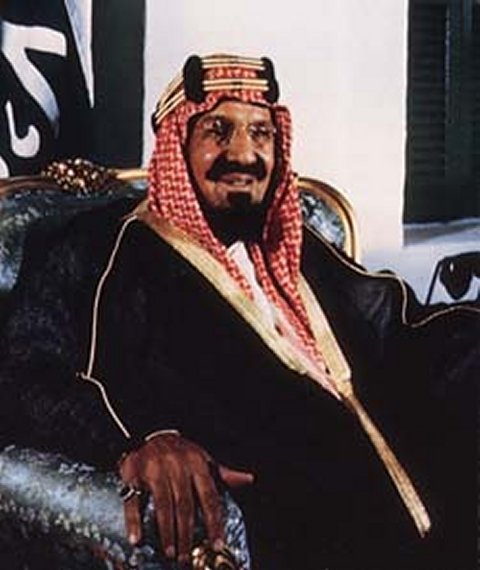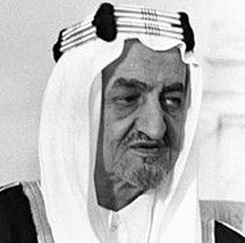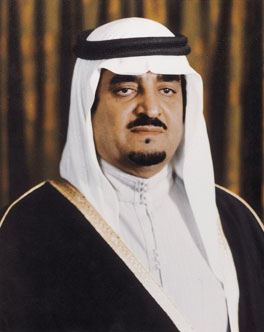However, along with the benefits, education, economic growth, social growth, and ties with the United States are all strained in order for the Saudi Arabian kingdom to grow and flourish peacefully. Because the United States has helped the Saudi Arabian economy grow, Saudi Arabia can provide help to any country in need, which helps the Arab world form together as ties beyond religion seem to be forming.
King Abdulaziz-
 |
| King Abdulaziz enjoying his success as well-liked ruler and King of Saudi Arabia |
King Saud-
 |
| King Saud (1953-1964) |

King Faisal bin Adbulaziz-
King Faisal is another amazing example for the leaders of the Arab World. King Faisal's reign lasted from 1964 to 1975. Faisal helped the economic development of Saudi Arabia, as well as influenced the social growth of his growing country. On top of this, King Faisal had also promoted education for young women and was proven to be one of the first rulers to establish more rights for women during this time period. Arab peace was a major goal of Faisal's, as he constructed the Jaddah of the Organization of the Islamic Conference in 1971. This promoted Islamic unity and order for 56 of their neighboring countries, even though two wars were fought between the Arab people and the Israelis over oil in 1973.
| King Khalid bin Abdulaziz (1975-1982) |
King Khalid bin Abdulaziz-
King Khalid was king of Suadi Arabia from 1975 up until 1982 after King Faisal had passed away. Khalid was a major supporter of economic prosperity and created the Gulf Cooperative Council, which helped promote economic security for multiple nations in 1981.
King Fahd bin Abdulaziz-
 King Fahd ruled Saudi Arabia from 1982 to 2005. Instead of being called the King of Saudi Arabia, King Fahd took on the title of Custodian of the Two Holy Mosques. King Fahd was the first Saudi Arabian king to hold municipal elections for government, giving the Saudi Arabians more freedom. He promoted more socials and economic development as well as peace between Arab people and Israelis. Diversity was another idea that Fahd had promoted as new immigrants migrated to Saudi Arabia rapidly. International crisis were always on the King's mind as he fought to solve global conflicts that did not even involve Saudi Arabia. Problems between Israel and the Arab world began to arise, and King Fahd would try to resolve the issues using an eight-point plan, as well as give Palestine its own country to live in by themselves. King Fahd was so good at resolving conflicts that his ideas were used within the Arab league in 1982.
King Fahd ruled Saudi Arabia from 1982 to 2005. Instead of being called the King of Saudi Arabia, King Fahd took on the title of Custodian of the Two Holy Mosques. King Fahd was the first Saudi Arabian king to hold municipal elections for government, giving the Saudi Arabians more freedom. He promoted more socials and economic development as well as peace between Arab people and Israelis. Diversity was another idea that Fahd had promoted as new immigrants migrated to Saudi Arabia rapidly. International crisis were always on the King's mind as he fought to solve global conflicts that did not even involve Saudi Arabia. Problems between Israel and the Arab world began to arise, and King Fahd would try to resolve the issues using an eight-point plan, as well as give Palestine its own country to live in by themselves. King Fahd was so good at resolving conflicts that his ideas were used within the Arab league in 1982.Civil War broke out in Lebanon, and King Fahd tried to resolve the issues by meeting with their leaders. As Israel invaded Kuwait, Saudi Arabia came in and forced the Israelis out of Kuwait, solving the crisis. Financial aid is also offered by Saudi Arabia as other countries (like Turkey in 1999) suffer environmental problems.
King Abdullah-
 The current Saudi Arabia ruler, King Abdullah bin Abdulaziz, inherited the throne in 2005. He was born in Riyadh, the capital of Saudi Arabia, in 1924 and was thoroughly educated. As a youngeon, Abdullah traveled with the Bedouin tribes around the desert and had gained a feel for living on his own. Just like his ancestors, King Abdullah has learned that Arab-Israeli peace is the way to go in order to succeed in government. As well as this, King Abdullah has continued to hold municipal elections, just like his father, King Fahd.
The current Saudi Arabia ruler, King Abdullah bin Abdulaziz, inherited the throne in 2005. He was born in Riyadh, the capital of Saudi Arabia, in 1924 and was thoroughly educated. As a youngeon, Abdullah traveled with the Bedouin tribes around the desert and had gained a feel for living on his own. Just like his ancestors, King Abdullah has learned that Arab-Israeli peace is the way to go in order to succeed in government. As well as this, King Abdullah has continued to hold municipal elections, just like his father, King Fahd.King Abdullah maintains good ties with the United States, as he has visited multiple times. Because Saudi Arabia is sometimes looked upon as pro-terrorism, King Abdullah is trying to diminish this stereotype. He has organized groups like the International Counter terrorism Conference to talk to other countries about the negatives of terrorism. This helps Saudi Arabia gain back its reputation because the terrorist attacks were not started by the Saudi Arabian government.

No comments:
Post a Comment